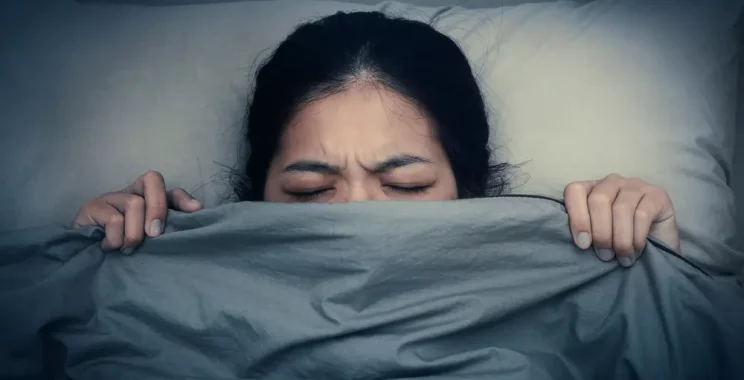Nightmare Disorder – Symptoms And Causes
Share
Fact checked
Reviewed by experts
Updated
January 9, 2023
Quick read
6 mins to read
List of Content
Nightmares can significantly impact our lives as they make us anxious and stressed, leading to insomnia and sleep disorders. It can be an unrelenting condition, one of the many that plague people. Therefore, it is necessary to know the symptoms and causes of nightmares so that you can seek professional help to avoid complications.
What Are Nightmares
A nightmare is a sleep disorder in which people experience frightening or disturbing dreams. These dreams can be intense enough to wake people up from sleep. Many people with nightmares report terror, fear, or anxiety upon waking. Some people may also experience physical symptoms such as a rapid heart rate or sweating.
Various factors, including stress, anxiety, medications, and sleep disorders, can cause nightmares. In some cases, nightmares may signify a more serious underlying condition, such as post-traumatic stress disorder (PTSD).
What Causes Nightmares in Adults
Adults typically experience nightmares due to stress or anxiety. These are some of the most common reasons for precisely what causes nightmares. However, other potential causes of nightmares exist, such as sleep disorders, medications, and underlying medical conditions.
Sleep disorders that can cause nightmares include sleep apnea, restless legs syndrome, and narcolepsy. Medications that may cause nightmares include antidepressants, blood pressure medications, and steroids. Underlying medical conditions that can lead to nightmares include Alzheimer’s disease, cancer, and post-traumatic stress disorder (PTSD).
If you regularly experience nightmares, you must talk to your doctor. Treatment for nightmares typically involves solving the underlying issues causing the nightmares. For example, therapy may be recommended if nightmares are caused by stress or anxiety.
What Is Nightmare Disorder
Nightmare disorder, also known as dream anxiety disorder, is a condition that causes people to experience nightmares. These nightmares can be extremely vivid and realistic, often occurring during the REM (rapid eye movement) stage of sleep. Various factors, including stress, anxiety, trauma, and certain medications, may cause nightmares.
10 Ways to Stop Nightmares
When you suffer from nightmares, you might want to know every possible way how to deal with nightmares, as it can feel like you’re trapped in a never-ending cycle of terror. But there are things you can do to break free from this vicious cycle.
Fortunately, if you want to know how to get rid of nightmares, there are ways to do so.
Establish a Sleep Routine
One of the best ways also considered a natural remedy for nightmares, is to establish a regular sleep routine. This means going to bed and waking up at the same time each day.
Moreover, cutting off caffeine is equally effective if you often wonder how to stop having nightmares as a teenager. Creating a relaxing bedtime routine can also help, such as reading or taking a warm bath.
Cut Back on Alcohol
If you’re struggling with nightmares and wondering how to stop nightmares in adults, one of the best things you can do is cut back on alcohol. Although drinking can help you relax and fall asleep faster, it can cause more nightmares. That’s because alcohol is a diuretic, which can dehydrate your body and interfere with sleep.
Don’t Eat Before Bed
It’s no secret that what you eat can affect your dreams. For example, eating a large, greasy meal before bed can lead to nightmares, while consuming healthy snacks can help you sleep more. So if you’re wondering how to stop having nightmares, one of the best things you can do is avoid eating before bed.
Review Your Medications
If you are experiencing nightmares, it is essential to review your current medications. Some medications can cause side effects that include nightmares. Plus, if you consume melatonin and it is causing you trouble, consider taking it 1 hour before bedtime.
Practice Stress-Relieving Activities
If you want to know how to stop recurring nightmares, note that practicing stress-relieving activities is one of the best ways. Various activities can help reduce stress, so finding one (or a few) that work well for you is essential. These activities include yoga, meditation, deep breathing exercises, journaling, and spending time in nature. Moreover, this method can be equally effective if you’re wondering how to stop pregnancy nightmares.
Journal Your Worries
If you experience regular nightmares and wonder how to stop PTSD nightmares, keep a journal by your bed. Whenever you have a nightmare, jot down what happened in the dream.
Over time, you may start to see patterns in your dreams that can help you identify what’s causing them. Some experts believe that nightmares are our brain’s way of processing trauma or stress. This can also be a result of post-traumatic stress disorder (PTSD). If this is the case and you want to know how to stop having nightmares PTSD may cause, journaling can also be a therapeutic way to work through your feelings.
Of course, if you’re having nightmares so frequently that they impact your life quality, it’s essential to seek professional help to stop nightmares. A therapist can help you identify any underlying issues causing nightmares and treat them.
Don’t Watch Or Read Scary Content Before Bed
It can be tough to avoid scary content before bed – whether it’s the news, a horror movie, or a thriller book. But if you’re wondering how to prevent nightmares, avoiding anything scary before you sleep.
Scary content can cause nightmares because your brain is trying to process what you’ve seen. It’s essential to give your mind time to relax before bed, so it can adequately rest during the night. If you get too worked up before sleep, you’re more likely to have nightmares.
To avoid nightmares, read happy stories, listen to relaxing music, or watch a comedy show.
Rewrite The Ending
If you’re wondering how to avoid bad dreams, try to remember your nightmares as much as possible and rewrite the ending in your journal in a more positive light.
Use a White Noise Machine
If you have difficulty falling asleep or staying asleep and wondering how to stop lucid dreaming nightmares, a white noise machine may help. White noise is a consistent, low-level sound that can block out other noises and help you relax. It can also mask the sounds of your partner snoring or outside traffic.
Check Up on Your Mental Health
It’s essential to check in on your mental health regularly, and one way to do that is by keeping track of your nightmares. If you’re having nightmares more often than usual, or if they’re particularly intense or graphic, it’s a good idea to talk to a mental health professional. And so, if you’re curious about how to stop getting nightmares, they can help you figure out what might be causing them and how to deal with them.
How Are Nightmares Different From Sleep Terrors
While both nightmares and sleep terrors can be frightening, there are some critical differences between the two. Nightmares are usually caused by stress or anxiety and can be pretty upsetting. They typically involve scary or violent images and often wake us from sleep feeling frightened and confused. Sleep terrors, on the other hand, are much less common. Also known as night terrors, they usually occur in children between the ages of 4 and 12.
Moreover, nightmares typically occur during REM sleep (when we dream), while sleep terrors occur during non-REM sleep (usually in the first few hours of sleep). Additionally, people who experience nightmares generally remember them upon waking, whereas those who have had a sleep terror may not recall the event. Finally, people with night terrors often physically act out their fears – thrashing around in bed, screaming, etc. – whereas those having a nightmare usually remain still.
What Are the Health Impacts of Adult Nightmares?
Most adults will experience a nightmare at some point in their lives. While nightmares are generally not harmful, they can cause some short-term distress. For some people, however, nightmares can be a persistent problem that disrupts sleep and causes other health problems.
The health effects of adult nightmares can vary depending on the underlying cause. In general, however, nightmares can lead to poor sleep quality and quantity, which can, in turn, cause fatigue, irritability, and difficulty concentrating. Nightmares may also contribute to anxiety and depression. Therefore, if you’re having persistent nightmares, you must talk to your doctor.
Conclusion
Nightmare disorder can be debilitating, causing fear and anxiety that can significantly interfere with your life quality. However, if you want to explore how to stop trauma nightmares, several treatments are available to help lessen the frequency and severity of nightmares. If you think you may be suffering from a nightmare disorder, talk to your doctor or a mental health professional to get started on the road to recovery.
FAQs:
Nightmares may be trying to tell you something about your mental state. For example, nightmares may be more frequent if you’re experiencing anxiety or stress. And if you have post-traumatic stress disorder (PTSD), you may also have nightmares about the event that caused your trauma.
Various things, including stress, anxiety, and certain medications, can cause nightmares. For many people, stress is the leading cause of nightmares. Anxiety and medication can also trigger nightmares.
First, keep a dream journal and write down your dreams as soon as you wake up. Then, try relaxation techniques before bedtime, such as reading or a warm bath. And if your nightmares are particularly vivid or disruptive, talk to your doctor about whether therapy might be helpful.
Researchers believe that nightmares may be a way for our brains to process trauma or fear. When we dream, our brain is in a state similar to meditation, where we allow access to parts of our subconscious that we may not be able to during waking hours.
This website does not offer medical advice nor professional medical services; rather, it is provided solely for educational, informational, and/or entertainment purposes. Individuals seeking medical advice should consult a licensed physician. The information provided should not be used for diagnosis or treatment of any condition, disease, or injury. When you have a medical condition, you should always talk to licensed doctor or other certified medical professional. You should never delay seeking professional medical advice or treatment based on the contents of this website. Call 911 or immediately go to the nearest emergency room if you think you may have a medical emergency. The contents of this website are provided “as-is”, Sleep Authority and its parent, subsidiaries, affiliates, employees, contributors disclaim any warranty of the information contained herein. Please contact using contact form to report any errors, omissions, misinformation, or abuse.
Sleep Authority is brought to you by Resident, the company that brings you Nectar, DreamCloud, Awara, Wovenly, Bundle, Home Well Designed and Level Sleep.



